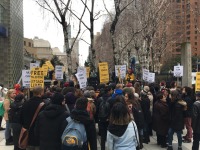By Theresa Schliep

Students in support of Students for Justice in Palestine (SJP) at Fordham’s Lincoln Center campus protested on Monday, after Keith Eldredge, dean of students at Lincoln Center vetoed United Student Government’s decision to approve the club.
SJP has chapters at schools across the country, including Columbia University and Boston College. The club is “centered on advocating for the rights of Palestinians,” according to Sapphira Lurie, FCLC ’17 who had planned on joining the club.
Students presented a list of demands for the university that derive from a Palestine Legal letter to the university, according to Lurie.
The demands are that the university approve SJP as a club, the university issues a public written apology directed to SJP club members “for suppressing our right to free speech and our right for advocacy on campus, issue a written apology committing to free speech on campus and issue a public statement committing to protection to all students regardless of national origin,” said Lurie.
Eldredge provided the University’s official statement to The Fordham Ram, but declined further comment due to possible litigation.
“Fordham has no registered student clubs the sole focus of which is the political agenda of one nation against another nation. For the University’s purposes, the country of origin of the student organizers is irrelevant, as is their particular political stance. The narrowness of Students for Justice in Palestine’s political focus makes it more akin to a lobbying group than a student club. Regardless of the club’s status, students, faculty, and staff are of course free to voice their opinions on Palestine, or any other issue.”
On Jan. 17, Palestine Legal published the aforementioned letter, addressed to Rev. Joseph M. McShane, S.J. president of the university. It included correspondences between various parties, including but not limited to Eldredge, Ahmad Awad, FCLC ’16 who sought to be president of SJP, Glenn Hender, English professor and almost-advisor of SJP and United Student Government.
In an email sent by Eldredge, according to Palestine Legal, Eldredge said that he cannot pledge support to this club because it advocates for a political purpose at the expense of the state of Israel.
“While students are encouraged to promote diverse political points of view, and we encourage conversation and date on all topics, I cannot support an organization whose sole purpose is advocating political goals of a specific group and against a specific country,” said Eldredge in the email.
Awad said he was shocked at the dean’s decision to veto. What particularly shocked Awad, he said, was the language used by the dean.
Awad finds that Eldredge, advocating for Fordham’s openness to discussing new ideas and prohibition of the club, is a contradiction.
“I was absolutely shocked- especially by some of the language that Dean Eldredge used,” said Awad. “When he stated that even though Fordham promotes human rights and looks to broaden discussion and dialogue on different topics, we won’t allow SJP… my jaw dropped.”
What specifically “presents a barrier to open dialogue and mutual understanding and respect,” Eldredge wrote, is the club’s support for Boycott, Divestment and Sanctions (BDS) of Israel.
Awad disagrees.
“Boycott movements have been one of the most successful and peaceful non-violent ways of bringing social and political change throughout the world in the 20th century,” said Awad.
Leighton Magoon, FCLC ’17, president of United Student Government Lincoln Center, said the student governmental body stands by its initial vote of approval. He provided USGLC’s official statement to The Fordham Ram.
“After careful deliberation, United Student Government has faith that this chapter of Students for Justice in Palestine at Fordham and its members will positively contribute to the Fordham community in such a way that is sensitive to all students on campus. United Student Government is dedicated to the safety of all students and has faith that Students for Justice in Palestine can function on campus respectfully. This chapter of Students for Justice in Palestine at Fordham fulfills a need for open discussion and demonstrates that Fordham is a place that exemplifies diversity of thought. Their presence will help to create a space for academic discussion and promote intellectual rigor on campus. We do not believe that the presence of Students for Justice in Palestine will take away from efforts to promote a safe environment on our campus.”
Lurie said in an email interview with The Fordham Ram that the club submitted its original club application on Nov. 19, 2015. She said that the club “received no administrative response to our application until we reached out again on April 5th of 2016.”
After a meeting on April 26th, 2016 and several more in Fall 2017, USG approved the club on November 17, 2016, according to Lurie. On December 12, 2016, Dean Eldredge met with SJP members for more questions, and on December 22, 2016, Eldredge decided to veto the club request.
Since the veto, various petitions have circulated online, among both students and faculty, and Awad published an Op-Ed with the New York Daily News.
Awad said students are going to remain active.
“We have to remain active, we have to remain committed to this cause,” said Awad. “If we cave in under the administrative pressure, this is all going to go to waste, so we’re refusing to let this go to waste, push over and die out. We’re going to continue to garner support and push moving forward.”







































































































































































































